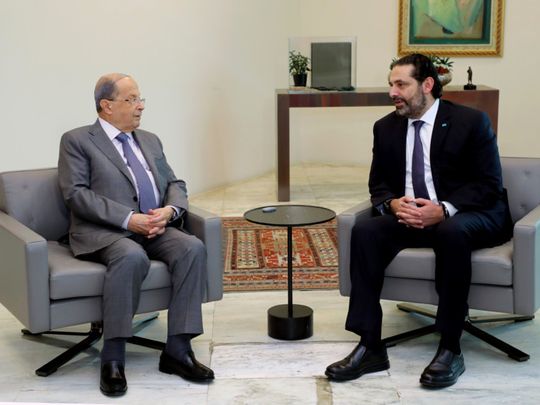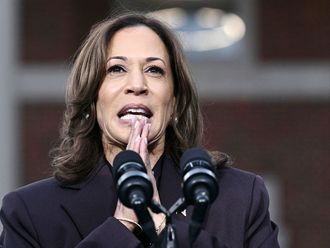
Lebanon is back to square one, after former economy minister Mohammad Al Safadi issued a statement late Saturday night, turning down nomination to become the country’s next prime minister. It would have been political suicide had he said yes, given the amount of rejection that was voiced on the streets of Beirut. The 75-year-old Sunni billionaire from Tripoli was too old, more dangerously, too entrenched with the current oligarchy to please the thousands of young men and women who have joined the uprising one month ago, demanding economic reforms and rehaul of the entire political system. All sides are now turning to Sa’ad Hariri — yet again — asking him to accept the impossible job.
It was Hariri after all who endorsed Safadi for the premiership, expecting no doubt, that people will reject his nomination. He might still name a second Sunni alternative, or even a third, waiting for them to be rejected as well, one after the other, before finally accepting to return to office, with clear preconditions. Hariri has made it clear that he will only return if mandated to lead a technocrat government, one where people are chosen for their professional merit rather than their political affiliations. This would rid him of the controversial Gibran Basil, son-in-law of President Michel Aoun and foreign minister since 2014. Much of the public outcry was directly against Basil, accused of corruption, arrogance, and autocracy. With good reason, Hariri wants him out.
The Gibran Basil dilemma
Gibran is clinging onto the post, however, saying that if a cabinet of technocrats does see the light, there would be no room for either him or Hariri, since both are politicians and not technocrats. Both are heads of political parties who command parliamentary blocs that entitle them to a proper share of government. Gibran’s bloc, representing the Free Patriotic Movement (FPM), is composed of 29 MPs while that of Hariri has 20, representing the Future Movement. They jointly came to power in late 2016 after an agreement was reached, making Aoun president in exchange for calling on Hariri to return to the premiership, from which he was ejected in 2011.
All sides need to make bold concessions, and this specifically applies to the Aounists, who carry the keys to solving the crisis.
For its part, the Hariri team is arguing that the agreement with Aoun applied to Aoun only, with no annex or gentleman agreement to make Basil foreign minister. Basil insists, however, that he and his father-in-law are part of one package — they came to power together and will only leave office together. He is also insisting that if Hariri stays in office, then so should he.
Hezbollah has its full weight behind Basil, although it was never too fond of him, considering him an opportunist and a charlatan. They feel that he is a very unreliable ally, certainly no match for Michel Aoun, who stood by them through thick and thin since 2006. Basil, however, has cuddled up to pro-Western politicians during the parliamentary elections of 2018 and last November, raised eyebrows in Hezbollah circles by comparing Syrian presence in Lebanon to the pre-1943 French occupation of Lebanon. He is only using Hezbollah to make it to the presidency, when Aoun leaves office or should he be incapacitated due to old age or forced to resign. And in turn, they are using him to please his aging father-in-law and accommodate his large parliamentary bloc, which might easily be slashed in half, should early elections be called.
A techno-political government
To meet halfway with Hariri, Hezbollah leaders are suggesting a “techno-political government” rather than a technocrat one, where service-oriented portfolios go to independents chosen for merit, and “sovereignty posts” are kept in the hands of the political parties, like foreign affairs, defence, interior, justice, economy, and finance.
This will be difficult for Hariri to digest. His team currently hold six out of 30 seats in the cabinet. Two of them are already up in the air, first being the Ministry of Information, which Hariri has promised to abolish, and second is the Ministry of Interior, which Hezbollah wants to go to Abbas Ebrahim, the powerful director of general security, who is a Hezbollah ally. That would keep the Hariri bloc with three portfolios and the premiership, which is less than what their parliamentary bloc merits. The other main “sovereignty posts” are in the hands of the Free Patriotic Movement, being defence, foreign affairs, justice, and economy, whereas the portfolio of finance is held by Nabih Berri’s Amal Movement, another Hezbollah ally. Both Amal and the Free Patriotic Movement insist on the exact same seats that they currently hold in the outgoing Hariri government. The gridlock becomes more problematic if the future cabinet is slashed down from 30 to 16 or 18 ministries, in order to cut back on public spending, leaving Hariri with nothing but a fraction of the seats that he is claiming or deserves.
Bold concessions
Another hurdle is the Lebanese Forces of Samir Geagea, which withdrew its four ministers from the Hariri cabinet at the start of the revolt last month. They too were never satisfied with their share, saying that their parliamentary bloc (15 seats) merits a more substantial representation in government. They feel that the Aounists were accommodated at their expense and given the lion’s share of Christian seats, demanding wider and more substantial representation in the next government.
These are no small issues. They can take weeks — perhaps month — to address. Meanwhile, the Lebanese pound continues to devaluate, putting people’s savings in risk. All sides need to make bold concessions, and this specifically applies to the Aounists, who carry the keys to solving the crisis. At this stage, all they need to do is withdraw Basil’s candidacy for any cabinet post, and keep their share of current seats, perhaps giving them to professionals affiliated with the Free Patriotic Movement, rather than official party members. That would defuse much of the public anger and prompt all sides to act in good faith. Judging from Basil’s comments and ambitions, however, we are not there yet. In fact, we are still very far away.
— Sami Moubayed is a Syrian historian and former Carnegie scholar. He is also author of Under the Black Flag: At the frontier of the New Jihad.









